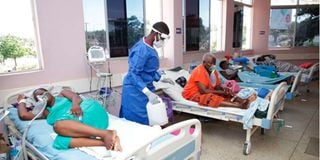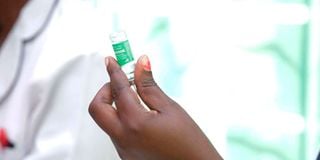Kisumu County to scale up testing amid Covid-19 crisis

A nurse attends to Covid-19 patients recuperating at Jaramogi Oginga Odinga Teaching and Referral Hospital in Kisumu County on June 10, 2021.
Kisumu County government will scale up Covid-19 testing after receiving 6, 000 rapid testing kits from the Ministry of Health headquarters as it seeks to prevent further spread of the virus.
Currently, there are 687 active cases in the county, 112 of them in hospitals.
An update by the county health department on Thursday evening showed Kisumu Central remains the epicenter of the disease followed by Kisumu East and Kisumu West sub-counties.
County Health and Sanitation Executive Boaz Nyunya said:
“Our public and private hospitals have overstretched their capacities as more cases emerge.”
“We have a weekly positivity rate of 28.4 per cent. The county has cumulatively reported 139 deaths since March 2020, reflecting a case fatality rate of 2.4 per cent,” Prof Nyunya said.
The Covid-19 isolation centre at Jaramogi Oginga Odinga Teaching and Referral Hospital in Kisumu County, as pictured on June 10, 2021.
A multi-agency team has held crackdowns targeting those flouting Covid-19 protocols. Several people have been arrested and bars closed down.
Two county courts have been put in place to handle those flouting Covid-19 rules, including those not wearing their face masks properly. Recently, residents who went for Covid-19 tests were turned away for lack of testing kits.
The rapid testing, according to Prof Nyunya, will give a clearer picture of the status of infection in the region and in turn inform the mitigating measures the county Covid-19 Emergency Response team will take to prevent the spread of the virus.
The move will be a major boost for the county which has reported a steady increase in Covid-19 infections in the past few weeks.
“Kisumu has so far registered 5,994 accumulative Covid-19 cases, from 43,000 tests. This presents a weekly positivity rate of 28.4 per cent,” said Prof Nyunya.
He said that the county has so far vaccinated some 32, 587 people against the virus, with 4,635 having received the second dose as of last week.
Last Monday, a county Covid-19 multi-agency meeting co-chaired by Governor Anyang’ Nyong’o and County Commissioner Josephine Ouko announced containment measures aimed at stemming the spread of the virus.

A nurse prepares a Covid-19 vaccine dose for administration at Jaramogi Oginga Odinga Teaching and Referral Hospital in Kisumu County on March 9, 2021. A nurse prepares a Covid-19 vaccine dose for administration at Jaramogi Oginga Odinga Teaching and Referral Hospital in Kisumu County on March 9, 2021.
In this week’s crackdown, at least three night clubs caught operating past stipulated time were withdrawn while over 70 revellers were arrested and charged in court. The revelers were each fined Sh2, 000. The raid took place on Wednesday.
Covid-19 protocols
Mr Nyunya said that proprietors of bars which were found operating after 7pm, will have their licences cancelled. On the same day, police also arrested 19 Public Service Vehicles for flouting the Covid-19 protocols.
“Matatu Saccos whose fleet continue to flout the safety rules will be deregistered. Passengers failing to adhere to Covid-19 protocols will also face punitive actions,” said Prof Nyunya.
At least 110 people, who were arrested for not wearing face masks, have been arraigned in courts.
The county government has given a 48-hour notice to all the mortuaries in the devolved unit to release all bodies in their custody for burial, failure to which it will move to court to have them buried in mass graves as unclaimed bodies.
“Mortuaries that disobey the orders will also have their licences cancelled. We have established that the prolonged stay of bodies in the mortuaries leads to abuse of burial protocols, and eventually make it difficult to control the number of mourners attending such ceremonies.
In an earlier directive, bodies must be released from the mortuaries by 10am for burial on the same day. There are 212 bodies still being kept at various private and public morgues across the county.
Mortuaries have also been instructed not to accept bodies brought in from outside their premises, except for police cases. The facilities are also expected to file daily reports on the new bodies and related details.
All livestock auction markets across the county have suspended indefinitely. Already, Bar Korwa open air market in Seme sub-county has been closed indefinitely over lack of sanitary services.
Churches, mosques, temples and other places of worship are also being monitored closely to ensure they adhere to Covid-19 protocols.
Some churches have since suspended services after their members contracted Covid-19.
The 14 counties in the Lake region are bracing for the worst, with the ministry of health and the Lake Region Economic Bloc (LREB) secretariat warning that Nyanza and North Rift regions are likely to witness a surge of Covid-19 numbers in the next few days following the recent 58th Madaraka Day celebrations in Kisumu.
LREB is collating data of medical equipment and human resources available in the 14 counties, even as it works on beefing up inter-county border surveillance.
The bloc secretariat has proposed coordination of resources, referrals and care within the region to be enhanced besides conducting rapid testing.
The third wave has hit the lake region counties hard, with some devolved units facing bed capacity issues as well as lack of oxygen and Intensive Care Units to handle the ever growing number of critically ill Covid-19 patients.
In an advisory note, the LREB Committee of Eminent Persons established by the LREB governors has asked the 14 counties to urgently import more rapid testing kits and embark on serious testing, tracing and isolation protocols alongside community mobilisation for effective prevention measures to slow down spread of the virus.





